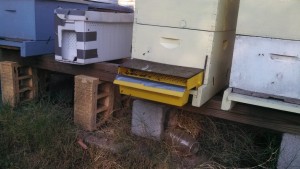Bee Research
by Guest Blogger Chicken Wrangler Sara
There are many wonderful things about living in a university town. There is a lot of energy and excitement created by the young, enthusiastic minds at work. There is also a lot of traffic but that is another matter entirely.
Part of being near a major research school is having research conducted all around. In fact, my husband was approached by a graduate student studying bees. He asked if he could use our bees in part of his research.
I didn’t think much about it at first. There are always random things going on at Miller Farm. Then our son made the comment “it is so neat that there is a research study happening in our back yard, literally.”
When he put it that way, I decided I should find out more about this research project.
 The graduate student put a pollen collector on one of the hives.
The graduate student put a pollen collector on one of the hives.
Once a month, Brian puts the guard down so the pollen is scraped off the bees legs as they enter the hive.
The graduate student then comes and collects the pollen. He also uses a pipette to extract nectar from some of the cells in the honey comb. He actually wanted to collect wax as well but the bees had not drawn any comb. The nectar flow had been interrupted by the rain in May. The pollen and nectar are analyzed to determine if there is any residual pesticide. The student also determines where the bees collected the pollen. It is all very interesting in a scientific research kind of manner.
So the next time you are perusing a science journal and see an article about bees and pesticide, think of Miller Farm. It is where all the action is.
